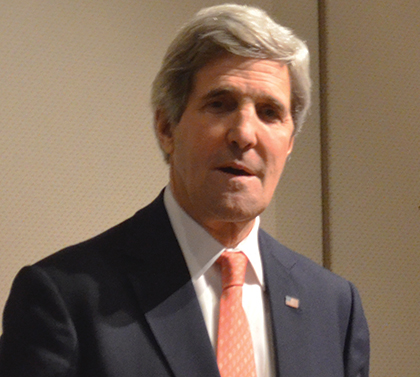
Secretary of State John Kerry speaks in Jerusalem on Jan. 3, 2014.
Tatiana Hasson has traveled to Israel, studied there and kept in touch with friends and family living in the country for years. She plans to move there someday after graduation.
But the senior community health major said with the most recent attempted Israel-Palestinian peace talks and negotiations, it’s hard for even her to grasp the details of the conflict.
“I still don’t have a complete picture,” she said. “It’s still hard for me to fully understand it.”
When Secretary of State John Kerry was appointed and confirmed in February 2013, he made another round of Israel-Palestine peace talks a priority. In late July 2013, Kerry announced plans for nine months of discussions to try and calm decades of conflict.
But the Israeli government announced it was halting the talks April 24, five days before their planned conclusion, after Palestine signed an agreement with Hamas, an advocacy group with historically anit-Semitic viewpoints.
Paul Scham, a visiting professor and the Gildenhorn Institute for Israel Studies executive director, said he has studied the Israel-Palestine conflict for years and recognizes that the political conditions to reach an agreement “didn’t seem to be there at all” during this round.
“The underlying political dynamics in Israel have to change before you can have a peace agreement,” Scham said. “You have a strange situation there, and that has to be changed before anything can happen.”
Both sides are blaming each other, Scham said, but none of it is completely straightforward, given the differing viewpoints on how the conflict should be understood.
On a college campus, Hasson said the idea of introducing uninformed students to a topic they don’t know about could be hard, given its lengthy background and history.
For this reason, Shalom Zionists at Maryland hosts “coffee chats” a few times throughout the semester to talk about aspects of Israel and its different perspectives, although the group is nonpartisan, said Hasson, the vice president.
“The way you come up with an opinion and the way you learn more is through conversation with other people,” she said. “Sharing thoughts, sharing opinions, sharing insights — we want to have that.”
But to Gabriella Kaiyal-Smith, the president of Students for Justice in Palestine, the most recent peace talks are just another failed attempt.
“For the Palestinian people, this isn’t something that was really of interest,” Kaiyal-Smith said. “It didn’t really affect us -— we’re just hoping and praying that more of our rights aren’t going to be taken away.”
The senior animal behavior major said SJP focuses on promoting Palestinian rights on the campus and in Arab lands. While the peace talks are supposed to entail two separate but equally powered parties coming together to negotiate with a mediating neutral party, this is not exactly the case, Kaiyal-Smith said.
“There is an occupying force negotiating with the occupied,” she said.
During university President Wallace Loh’s visit to the Middle East in April 2013, he signed academic partnerships with universities in Israel and Jordan. Some students are opposed to this agreement, Kaiyal-Smith said, as it could be viewed as the university leaning toward one side.
But Scham said he makes sure to stay unbiased during his course instruction at this university. In the fall, he will teach a course that will focus on both sides of the conflict through different lenses.
“A professor of a controversial course has a responsibility to present a variety of viewpoints,” Scham said. “And the emphasis in my courses is understanding the narratives of the two sides, how the two sides understand their history and their national existence, and trying to explain on those terms why it’s so difficult to make peace.”
Max Meizlish, Terps for Israel president and a junior government and politics major, said his student organization supports the talks and a two-state solution. However, the group does not take specific positions on domestic Israeli issues, as the members’ opinions vary.
Meizlish said everyone should form an opinion to be part of the campus conversation regarding the conflict, but it might be challenging in an environment where people take strong-leaning stances.
“This is a conflict that it’s very easy to take a side,” Meizlish said. “If you’re Jewish and you go to the University of Maryland, it’s really easy to identify with the Israeli cause without really recognizing the Palestinian narrative.”
Kaiyal-Smith said people on the campus seem apathetic or might have heard “chatter” about the topic and formed an opinion that way, but SJP does not have an official stance on the issue either.
“It hard for me, as a Palestinian American — I’ve seen the way that our hopes have been shattered every time we put everything into praying these peace talks will bring something,” Kaiyal-Smith said. “And every time, it’s ended up in catastrophe for us.”
Students on the campus have the right to join organizations and advocate a side, Scham said, but he said students from all backgrounds take interest in one or both sides of the conflict.
“We are not here to trumpet that Israel is great,” Scham said. “I always tell my students on the first day: The academic study is very different from what you may have heard elsewhere. And you have to be ready to at least deal with and understand different perspectives.”



